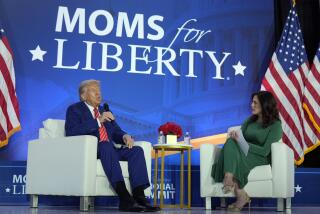Psst! We’re Here : Negotiating the diplomatic maze is hard even for savvy ambassadors from powerful countries. But for representatives of small, poor nations, it’s tough just reminding everyone that . . . Psst! We’re Here
The trouble with being the second in charge at the Embassy of Rwanda is that:
* You have to lure people to your embassy’s infrequent receptions;
* Amnesty International sends delegations to your embassy to charge that political prisoners are being mistreated in your country;
* Before your foreign minister comes to Washington, you have to spend weeks trying to persuade important congressmen to see him;
* You don’t have the run of a 59-room Tudor mansion like the Italian ambassador does.
“Nobody in Washington is interested in my country,” laments Christophe Habimana, the young Rwandan diplomat. “To America, we are unimportant.”
For newly elected Russian President Boris I. Yeltsin, all the thrill of ambassadorial Washington was rolled out last week. Hundreds swarmed to a reception at the Soviet Embassy in his honor, inhaling cucumber sandwiches and vodka. Even more extravagantly, the diplomatic finery went on display last month when Great Britain’s Queen Elizabeth II came for a state visit. At one reception in her honor, whole, succulent lamb chops were passed out as finger food--and it seemed every woman in the city bought a new straw hat for the queen’s garden party.
But the deputy chief of mission at the Embassy of Rwanda--and a great chunk of diplomatic Washington--were cut out of those events. The trouble with being posted in Washington when you’re from a small, poor, forgotten country on the fringes of world events is that you have to fight not to be ignored.
There are exceptions--like the man from Malta, a suave, experienced ambassador who has managed with a diplomatic staff of one to turn around his country’s anti-American image over the last three years. He sashayed at the best parties, though his own embassy was too small for receptions.
But beyond the exceptions, riding on the edges of the diplomatic carousel in Washington can be frustrating when an ambassador’s head of state is not a member of George Bush’s global “in” crowd.
Indeed, the duties of the Washington envoy are so complex and so coded that to accomplish them with a small staff and a skimpy budget, an ambassador simply must choose what not to do.
Instead of trying to sample every embassy’s canapes or endeavoring to get to know all members of the Senate Foreign Relations Committee, the men of Embassy Row (only four out of 145 are women) tend to narrow their focus.
Usually, their priority is getting more foreign aid and U.S. businesses to invest in their country. Some embassies pour every cent of their Foreign Ministry budget into hiring a lobbyist; others try to find American “groupies”--people sympathetic to their country--to help them through the diplomatic maze.
In an effort to dole out advice to beleaguered diplomats, Africare, a nonprofit developmental group, has organized a series of seminars in September. C. Paine Lucas, director of Africare, says the seminars will cover everything from how to hire a lobbyist to whether to use a caterer or serve traditional food at a reception. An example of questions that will be analyzed: If you have a two-person embassy, are you better off subscribing to the New York Times or inviting a key member of Congress to lunch? Whom do you call when there’s a rebellion in your country: the State Department or Voice of America? What’s free in Washington, other than the Lincoln Memorial?
Christophe Habimana is having a rough day. He has just bid farewell to the delegation from Amnesty International; this, after spending the morning--in fact, he has spent two weeks of mornings--trying to get an appointment on Capitol Hill for his foreign minister, who is arriving this Wednesday. He is weary, and as he lugs his tall, strapping body up the steps to his embassy office, he seems to carry the burdens of his tiny Central African nation on his back.
“In France I don’t need to go to the Parliament,” he says, referring to his experience as a diplomat in Europe. “The government in power has confidence in its Foreign Ministry. But not here. In America, there is Congress, the media, the State Department. . . . You have to convince them all.”
In his three years in Washington, few journalists have come by the embassy, a Victorian-era row house that, like many Washington embassies, maintains an outer elegance but is slightly seedy inside. Mostly the visitors to the Embassy of Rwanda have been other African diplomats, and supporters and an occasional official from the State Department. When the president of Rwanda visited last year, Assistant Secretary of State Lawrence Eagleburger dropped by the reception.
“Getting him here,” confides Habimana, “took a lot of work.”
Habimana’s country, a nation the size of Maryland with 8 million people, bought the four-story embassy for $50,000 shortly after the country’s independence in 1962. Today, the building is worth 10 times that much, although selling it would be foolhardy, Habimana explains, because the small staff would have to rent space elsewhere at astronomical rates. (The Bangladeshis rent an office over a dry cleaner for $18,000 a month.)
Rwanda already is spending $240,000 a year to operate the embassy in Washington. Although that’s nothing when compared to the big embassies, which spend twice that much just on parties, it is too much for the Rwandans, according to Habimana.
“If I had a lobbyist who I paid $30,000 or $40,000, it would be much easier to get in to see the congressmen,” Habimana says with resignation.
“At the end of the day, it’s interest: if you have something of interest to the Americans, they’ll see you,” says Salv Stellini, the ambassador of Malta.
Stellini’s days in Washington are nearing an end. After 3 1/2 years he is transferring to the Court of St. James’s, having learned the hard way how an ambassador from the tiniest of embassies can make it here.
When Stellini first arrived in the United States, it was clear to him that his country’s image needed repair. The embassy, a sliver of a brick building wedged between a mammoth mansion owned by the Soviets and an ornate apartment house, was falling apart.
Stellini was sent by a new government that was doing everything possible to prove it was pro-Western, pro-American, pro-private investment. For three months he knocked on doors delivering that message to every congressman, every State Department offical and everybody else who would listen.
President Bush’s decision last year to meet Soviet President Mikhail S. Gorbachev off Malta certainly helped Stellini in his task of getting known around town. But the ambassador mostly helped his own case by strategically inserting himself as often as possible into Washington diplomatic circles.
“For all the meetings I went to,” says Stellini, “the dinners and receptions were much more important. That’s where people will tell you what you really want to know. That’s where you make contacts.”
Earlier this month, for example, Stellini and his wife, Lucinda, went to a charity barbecue at the home of Vice President Dan Quayle. The ambassador was seated next to an aide to Transportation Secretary Samuel Skinner. They became friendly and when, coincidentally, Stellini ran into Skinner a day later, he mentioned that he had met the aide. Skinner said the aide had mentioned Stellini to him as well. And the Cabinet member and the Maltese ambassador were suddenly fast friends.
“Now, if I was staying and there was something I needed from Transportation, I’d just pick up the phone and call the aide or Skinner himself,” Stellini says, smiling.
But if Stellini has been a master diplomat at making do with little, the master of lavishness was Wilhelm Wachtmeister, the former dean of the diplomatic corps, who retired in 1989 after serving 15 years as Sweden’s envoy to the United States. By all accounts, Wachtmeister and his wife, Ulla, epitomized the diplomatic couple.
Attractive and skillful at entertaining, they snowed the city with their fabulous parties and ability to get around, and when Wachtmeister retired Bush personally stopped at the ambassador’s house the night before the last party to wish him luck.
“The most important thing, perhaps a word equal to diplomacy, is contact, “ recalls Wilhelm Wachtmeister. “And it must be done right.”
Every day, dozens of ambassadors and their minions flock to Capitol Hill, trying to cultivate important congressmen and their minions. The diplomats are mostly after the same things--more foreign aid; a line slipped into legislation to benefit their country; trade advantages; attention and more attention.
For 12 years as a staff member on the Senate Foreign Relations Committee specializing in the Near East and South Asia, Peter Galbraith has seen a lot of foreign flags raised for visiting dignitaries and a lot of ambassadors come a-courting.
“There’s definitely a pecking order, with the Soviets, British, French and Canadians on top,” he says, “and so for the ambassador from, say, Burundi to get time with (a senator), the trick is to go into these meetings with something rather specific that you want to come away with.”
Galbraith has seen senators bypass an envoy on a mission. Once the Senate was holding a routine tea for a visiting dignitary--on this occasion the president of Bangladesh--and not one U.S. senator showed up.
But the savviest ambassadors from unimportant countries manage to get around the ways of Washington, Galbraith says. For example, he has known small embassies to throw a party specifically in honor of a senator whose attention they want.
“Those are great attention-getting devices,” Galbraith jokes.
He is too discreet to name names in discussing these do’s and don’ts of the ambassadorial world, but he points out that a lot of countries waste their hard-earned foreign aid on hiring Washington lobbyists to influence his bosses.
But most of Washington’s envoys would decline Galbraith’s advice if they had the money. In fact, the vast majority of embassies have lobbyists, paying as much as $3 million a year to curry favor with the powerful. So often countries that can’t afford the help feel they are at a comparative disadvantage--especially those who find the U.S. system baffling.
Without lobbyists, many ambassadors concentrate on building alliances with special-interest groups like conservationists or human rights advocates.
Margaret Taylor, the ambassador from Papua New Guinea, has turned to old friends in Washington, other South Pacific ambassadors and people she met while attending Harvard Law School.
A single mother who often entertains by cooking some of her country’s traditional food for guests, Taylor says she and her small embassy staff manage well by living in the same northwest Washington neighborhood and working together.
Yet while this a far cry from any of the lavish affairs put on at the Italians’ 21-acre ambassadorial estate near Rock Creek Park, Taylor is reluctant to have her operation seen as somehow deficient. She lists her country’s advantages over other nations: It is the seventh-largest gold-producing nation, and it has huge petroleum reserves and extraordinary forests and parks. She also notes that she has managed to get Rep. Stephen J. Solarz (D-N.Y.), the powerful chairman of the House subcommittee on Asian and Pacific Affairs, interested enough to come to Papua New Guinea this summer to go white-water rafting.
“I don’t have to go to the Hill,” she says proudly. “The congressman is coming to Papua New Guinea with me.”
Four Embassies That Make Do With a Lot Less
BANGLADESH
Population: 112 million
Number of embassy staffers: 40
Ambassador A. H. S. Ataul Karim is a hard worker known for taking a lot of the embassy’s work on his shoulders. He spends more time than most ambassadors over at the State Department, stopping in at least once a week. He is generally considered to be easy to work with.
MALTA
Population: 350,000
Number of embassy staffers: 4
Malta maintains one of Washington’s smallest embassies. Ambassador Salv J. Stellini’s priorities include promoting U.S. business interests in the island and gaining it American assistance.
PAPUA NEW GUINEA
Population: 3.6 million
Number of embassy staffers: 4
Margaret Taylor is the first female ambassador from the Pacific islands. She travels frequently outside of Washington to talk to business groups about investment opportunities in Papua New Guinea.
RWANDA
Population: 8 million
Number of embassy staffers: 10
Although Ambassador Aloys Uwimana has previously served as his country’s envoy to Japan, critics charge he still needs to learn about diplomacy in Washington: He’s been known to demand immediate access to top government officials. However, he’s also considered sharp and decisive.
Sources: The 1991 Almanac; the Embassies of Bangladesh, Malta, Papua New Guinea and Rwanda; Dossier Magazine; The World Factbook 1990
More to Read
Sign up for Essential California
The most important California stories and recommendations in your inbox every morning.
You may occasionally receive promotional content from the Los Angeles Times.






